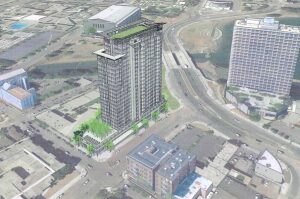Barbara Parker Cites Confidentiality, Refuses Comment on Sale of Property for Luxury Apartment Tower
May 22, 2015
Posted in Economic Development, Gentrification, Housing/Foreclosures, Politics, Responsive Government
By Ken Epstein
A local community group has not yet received a reply from City Attorney Barbara Parker about their complaint that the City of Oakland is violating local, state and federal laws in going ahead with the sale of public property to developers to build a luxury apartment tower at the East side of Lake Merritt.
“There are serious unanswered questions about the city’s compliance with federal, state and local laws governing disposition of this property,” according to a letter to the City Council on May 4 from lawyers for Public Advocates on behalf of the neighborhood group Eastlake United for Justice.
The lawyers urge the council to remove the agreement to sell the property at the corner of East 12th Street and Lake Merritt Boulevard from its agenda “until the city has publicly demonstrated that it has complied with all legal requirements.”

City Attorney Parker or her representative is generally present in all public and closed session meetings of the council. Her office was appraised of the decisions leading to the council decision to offer the property for sale and the proposed agreement with Urban Core Development and its financial partner UDR.
Parker’s officer has also received the letter from Public Advocates.
Reached for comment by the Post, Alex Katz, Parker’s chief of staff, said she does not respond to questions regarding her legal advice to the City Council, citing attorney-client privilege.

“We can’t talk out what advice we give the City Council or whether we’ve given them legal advice,” he said.
According to the letter from Public Advocates, the East 12th Street parcel qualifies as “surplus land,” and “disposition must therefore comply with all procedural and substantive provisions of the (California Surplus Lands Act).”
Under the law, the lawyers wrote, “All public lands no longer needed for public use (must) be made available for affordable housing, recreation, and other state priorities.”
In addition, the law provides that if property is sold to a developer, the city should seek to assure 25 percent of the units are reserved for affordable housing and at a minimum, “no less than 15 percent of the total number of units (are) developed on the parcels at affordable housing cost… or affordable rent…to lower income households.”
“There are no exceptions,” the letter said.
Members of Eastlake United for Justice also have repeatedly alleged that the city has violated its own procedures in this land deal. At several city meetings, they accused the council of making the decision to sell the property in closed session – without the public – and that the request for proposals only went out to three developers.
Further, the lawyers argued that the decision to sell the property violates the federal Fair Housing Act’s and California Fair Employment and Housing Act’s protections against reinforcing or perpetuating “segregated housing patterns…. regardless of intent.”
Approving an agreement with the developers “that allows for 100 percent luxury housing on a publicly owned site without including affordable housing, would disproportionately impact people of color and individuals with disabilities, perpetuating segregation in the city,” the lawyers said in their letter.
David Zisser, staff attorney for Public Advocates told the Post that the City Attorney’s office has received the letter, but, “They have not directly responded t it.”
“If the council had gone along with the provisions of the state Surplus Lands Act, 25 percent or 75 units out of the 298 units (in the project) would actually be affordable for Oakland,” said Zisser. “If they could not find a developer to do the 25 percent affordable housing, they still could do 15 percent or 45 units of affordable housing.”
“Everyone knows there’s a housing crisis in this city, and this crisis is causing the exodus of Oakland families. The council has talked about favoring a diverse, inclusive city and has the opportunity to do something about it,” he said.
“This not a technical legal maneuver. It’s the moral thing to do, it’s good policy, and it’s also legally required.”
Zisser emphasized that Public Advocates and community members are not picking a fight with Urban Core Development and its owner Michael Johnson. “This is not about blaming the developer. “It’s about what the city’s obligations are.”